
RHEOLOGICA ACTA
Scope & Guideline
Advancing the Frontiers of Rheological Science
Introduction
Aims and Scopes
- Complex Fluid Dynamics:
Research emphasizing the behavior of complex fluids, including non-Newtonian fluids, polymer melts, and colloidal suspensions, under various flow conditions. - Experimental and Numerical Methods:
Utilization of both experimental techniques (rheometry, microrheology) and numerical modeling approaches to investigate the rheological properties and behaviors of materials. - Material Characterization:
In-depth studies on the rheological characterization of advanced materials, including polymers, gels, and suspensions, to understand their mechanical properties and performance. - Yield Stress and Thixotropic Behavior:
Investigation into yield stress materials and thixotropic substances, focusing on their flow behavior, recovery, and applications in various industries. - Interfacial and Multiphase Rheology:
Exploration of interfacial phenomena and rheological behavior in multiphase systems, including emulsions and suspensions, emphasizing the role of interfaces in material properties.
Trending and Emerging
- Data-Driven Approaches and Machine Learning:
There is a notable increase in the application of machine learning and data-driven methods to rheological modeling and analysis, reflecting a trend towards integrating computational techniques with experimental data. - Rheology of Smart and Functional Materials:
Research into the rheological properties of smart materials, including magnetorheological and electrorheological fluids, is on the rise, emphasizing their potential applications in various technologies. - Sustainable and Green Materials:
The exploration of rheological properties in environmentally friendly materials, such as bio-based polymers and sustainable composites, is becoming more prevalent, aligning with global sustainability goals. - Multiscale Modeling and Simulation:
An increasing number of studies focus on multiscale modeling approaches to better understand complex fluid behaviors across different scales, from molecular dynamics to continuum mechanics. - Applications in Biomedical Engineering:
Emerging research concerning the rheology of biological fluids and materials, including blood and hydrogels, indicates a growing interest in applications within the biomedical field.
Declining or Waning
- Traditional Newtonian Fluid Studies:
Research focusing solely on Newtonian fluids has decreased, as the journal increasingly emphasizes non-Newtonian behaviors and complex fluid dynamics. - Basic Polymer Science without Rheological Context:
The exploration of polymer science topics that do not directly relate to rheological properties or behaviors is waning, as the journal pivots towards practical applications of rheology in materials. - Generalized Theoretical Models:
The publication of papers centered on generalized theoretical models without specific experimental validation or application has declined, indicating a shift towards more applied research. - Single-Phase Fluid Dynamics:
Papers focusing exclusively on single-phase fluid dynamics have become less frequent, with a growing interest in multiphase systems and their complex interactions.
Similar Journals

JOURNAL OF ELASTICITY
Advancing the Frontiers of Elasticity ResearchJOURNAL OF ELASTICITY is a prestigious peer-reviewed journal dedicated to the study and advancement of the field of elasticity and its numerous applications across various disciplines. Published by SPRINGER, and located in the Netherlands, this journal has been a key resource since its inception in 1971, providing critical insights and developments up through 2024. With a commendable impact factor and categorized within the Q2 quartile in areas such as Materials Science, Mechanical Engineering, and Mechanics of Materials, the journal maintains a significant standing in the academic community. Researchers and professionals will find a wealth of knowledge through advanced theoretical and experimental studies published within its pages, contributing to both foundational understanding and practical applications. While currently not an open access publication, the JOURNAL OF ELASTICITY remains an essential platform for innovative research and discussions that shape the future of mechanical sciences.
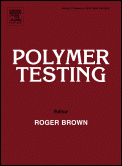
POLYMER TESTING
Connecting Researchers to Cutting-Edge Polymer DiscoveriesPOLYMER TESTING is an esteemed academic journal published by Elsevier Science Ltd, focusing on advancements in the field of polymers and their applications. With a high impact factor and category quartiles reflecting its influence, it ranks in the Q1 quartile in both Organic Chemistry and Polymers and Plastics, indicating its crucial role in shaping research in these disciplines. The journal has been open access since 2021, ensuring that cutting-edge research is readily available to researchers, practitioners, and students alike. Covering the convergence of foundational and innovative studies from 1980 and continuing through 2024, POLYMER TESTING appeals to a diverse audience, from materials scientists to chemical engineers, providing a platform for high-quality peer-reviewed articles that advance our understanding of polymer behavior, performance, and applications. If you are looking to stay abreast of the latest trends and breakthroughs in polymer science, POLYMER TESTING is your go-to resource.
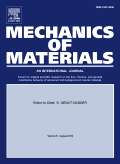
MECHANICS OF MATERIALS
Elevating Knowledge in Engineering and Materials ScienceMECHANICS OF MATERIALS, published by ELSEVIER, is a premier international journal serving the dynamic fields of Materials Science and Mechanics. With an esteemed reputation reflected in its 2023 Quartile rankings—Q1 in Instrumentation, Q1 in Materials Science (miscellaneous), and Q1 in Mechanics of Materials—this journal offers a vital platform for the dissemination of cutting-edge research from 1982 to the present. Operating from its headquarters in Amsterdam, Netherlands, the journal boasts impressive Scopus ranks, including 22nd in Physics and Astronomy (Instrumentation) and 67th in Engineering (Mechanics of Materials), placing it firmly within the top echelons of academic publishing. Though not an open-access journal, its rigorous peer-reviewed content ensures high-quality contributions aimed at advancing knowledge and application in mechanics and materials. Researchers, professionals, and students are encouraged to engage with the latest studies and findings that underpin innovations in material properties, testing methodologies, and engineering applications, reinforcing the journal’s critical role in shaping the future of the discipline.
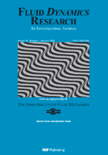
FLUID DYNAMICS RESEARCH
Navigating the Depths of Fluid Dynamics ResearchFLUID DYNAMICS RESEARCH, published by IOP Publishing Ltd, is a pivotal journal dedicated to advancing the understanding of fluid dynamics through interdisciplinary research that spans several domains including mechanical engineering and physics. With an ISSN of 0169-5983 and E-ISSN 1873-7005, this journal provides a vital platform for researchers aiming to disseminate new findings and theoretical advancements in fluid flow and transfer processes. As of 2023, FLUID DYNAMICS RESEARCH holds a commendable position within the academic community, ranked Q3 in fluid flow and transfer processes, mechanical engineering, and miscellaneous physics and astronomy categories. The journal showcases a diverse array of articles that not only inspire collaboration among professionals and students but also ensure that theoretical and experimental studies are accessible for further development in the field. Operating from the United Kingdom, the journal offers a unique opportunity for scholars worldwide to contribute to the vibrant community dedicated to understanding the complexities of fluid dynamics, even as it anticipates converging its years of research from 1986 to 2024.
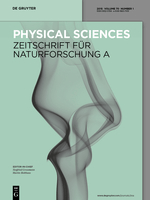
ZEITSCHRIFT FUR NATURFORSCHUNG SECTION A-A JOURNAL OF PHYSICAL SCIENCES
A Beacon for Researchers in the Physical SciencesZEITSCHRIFT FUR NATURFORSCHUNG SECTION A - A JOURNAL OF PHYSICAL SCIENCES is a distinguished journal published by Walter de Gruyter GmbH, based in Germany, that serves as a vital platform for research in the realms of mathematical physics, physical and theoretical chemistry, and broader disciplines within physics and astronomy. Established in 1946, this journal has been a cornerstone for scientists and researchers, providing rigorous peer-reviewed articles that push the boundaries of knowledge in physical sciences. With a notable 2023 Scopus ranking reflecting its respected position in the field—Q3 in mathematical physics, physical and theoretical chemistry, and miscellaneous physics and astronomy—this journal not only emphasizes high-quality research but also enhances the visibility and impact of contributions within these areas. Although it does not currently offer open access, the insights shared in its pages are invaluable for advancing academic inquiry and sparking interdisciplinary collaborations. As it looks ahead to 2024, ZEITSCHRIFT FUR NATURFORSCHUNG SECTION A continues to invite contributions that align with its mission to foster an understanding of complex physical phenomena, making it an essential resource for academics, professionals, and students alike.
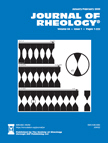
JOURNAL OF RHEOLOGY
Shaping the Future of Rheological ResearchJOURNAL OF RHEOLOGY, published by the SOCIETY OF RHEOLOGY, is a premier academic journal that has been disseminating significant research in the field of rheology since its inception in 1957. With a focus on the behavior of complex fluids and soft materials, this journal plays a crucial role in bridging the disciplines of Condensed Matter Physics, Materials Science, and Mechanical Engineering. Its esteemed ranking in the top quartile (Q1) of multiple categories highlights its impact, particularly in Mechanical Engineering and Mechanics of Materials. Researchers and professionals can benefit from the comprehensive studies published within its pages, which combine theoretical insights with practical applications in diverse industries. Although it does not offer open access, the journal remains a vital resource for those seeking cutting-edge developments and discussions in rheology. The editorial office is located in Japan, under the guidance of Ralph H. Colby at Pennsylvania State University, ensuring a strong academic foundation and international collaboration. The JOURNAL OF RHEOLOGY continues to shape the future of rheological research, making it an essential part of any scholar's library.
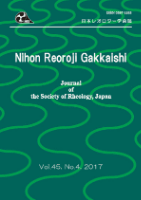
NIHON REOROJI GAKKAISHI
Elevating Understanding of Rheology and Its Practical ImpactsNIHON REOROJI GAKKAISHI is an esteemed journal published by the SOC RHEOLOGY, JAPAN, dedicated to advancing the field of rheology and its applications within condensed matter physics, materials science, and mechanical engineering. Since its inception in 1973, this journal has contributed significantly to the global discourse on fundamental and applied research, boasting a comprehensive coverage of innovative studies and breakthroughs up to 2024. Although it currently does not offer open access, it maintains a respected presence with a HIndex that reflects its historical impact and relevance. The journal is categorized in the Q3 quartile across several fields, indicating its essential contributions in these domains among a competitive cohort. With ranking positions of #454 in Mechanical Engineering and #334 in Condensed Matter Physics in Scopus, NIHON REOROJI GAKKAISHI remains an invaluable resource for researchers, professionals, and students aiming to explore and contribute to the ever-evolving landscape of materials science and engineering.

ATOMIZATION AND SPRAYS
Innovating the Future of Spray TechnologiesATOMIZATION AND SPRAYS, published by BEGELL HOUSE INC, stands at the forefront of research in the dynamic field of chemical engineering, particularly focusing on the intricate processes of atomization and the mechanics of droplet dynamics. Established in 1996, this prestigious journal aims to disseminate innovative findings and methodologies that drive advancements in applications ranging from spray technologies in industrial processes to environmental technology and energy conversion systems. With a current Impact Factor that reflects its significance within the community—ranked in the Q3 quartile—it serves as a comprehensive resource for researchers, professionals, and students eager to deepen their understanding of fluid mechanics and spray applications. Though not an open-access publication, it provides critical insights and a platform for scholarly communication and exchange in its converged years, fostering collaboration and innovation within the domain.
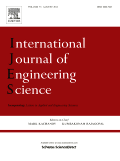
INTERNATIONAL JOURNAL OF ENGINEERING SCIENCE
Shaping the Future of Engineering Through Rigorous ResearchInternational Journal of Engineering Science, published by Pergamon-Elsevier Science Ltd in the United Kingdom, stands as a premier platform for pioneering research in the diverse fields of engineering and materials science. Since its inception in 1963, this journal has consistently demonstrated its commitment to advancing academic discourse, maintaining an impressive trajectory that positions it in the Q1 category across multiple engineering disciplines including Mechanical Engineering and Mechanics of Materials as of 2023. With notable Scopus rankings—placing it in the top 5% percentile for Mechanical Engineering and related fields—this journal attracts high-quality, impactful research designed for both industry practitioners and academic scholars. Although it does not currently offer Open Access options, its readership is enriched by comprehensive peer-reviewed articles, fostering a deeper understanding of complex engineering problems and innovative solutions. The International Journal of Engineering Science continues to be an invaluable resource for researchers, professionals, and students committed to pushing the boundaries of knowledge in engineering and materials science.

POLYMER SCIENCE SERIES A
Leading the Charge in Polymer Research and DevelopmentPOLYMER SCIENCE SERIES A is a distinguished journal dedicated to the field of polymer science, with a focus on advancing knowledge in materials chemistry and polymers and plastics. Published by MAIK NAUKA/INTERPERIODICA/SPRINGER, this journal provides a platform for researchers and practitioners to disseminate their findings and innovations. With an ISSN of 0965-545X and an E-ISSN of 1555-6107, it is widely accessible to the academic community. Although currently non-open access, the journal has maintained its significance since its inception in 1991, boasting an evolving emphasis on contemporary issues in polymer science up to 2024. Ranked in the Q3 category for both Materials Chemistry and Polymers and Plastics in 2023, POLYMER SCIENCE SERIES A plays a crucial role in the broader academic landscape, particularly for those committed to understanding and enhancing polymer materials. The journal’s reputation is solidified by its Scopus rankings, where it addresses critical advancements and fosters collaborative research opportunities within the community. We invite researchers, professionals, and students to explore the valuable insights published within these pages.